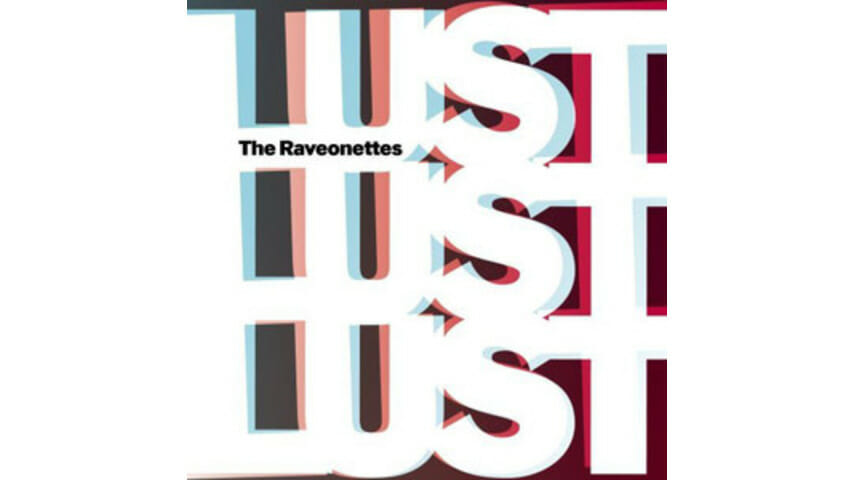
Minimalist Danish duo maintains its irresistibly twisted ways
Has the element of danger once so vital to rock ’n roll’s beating heart become something of a quaint cliche? Elvis’ ascendency was pure, forbidden, hip-shake sex. The Stones—especially when compared to their scrubbed-up moptop contemporaries from Liverpool—felt vaguely threatening and dirty to a suitably appalled Middle England. Guns N’ Roses made a virtue of the squalor from which they crawled. Hell, the entire punk ethos—even Nirvana’s version, located more than a decade after the initial threat was detected and snuffed out—was essentially born in a cesspool. Embedded somewhere in our deepest subconscious lies the equation “menace + mindless indulgence/noise = rawk.” So how best to convey the essential qualities of this algorithm in a medium that has been there, done that?
Three albums deep in their latterday foray into this well-trodden world of lasciviousness and licentiousness, The Raveonettes can now be added to this list. The Danish duo—Sune Rose Wagner and his aluminum (haired) foil, Sharin Foo—aren’t exactly today’s Pete Doherty or Amy Winehouse, consuming their way into rehab and/or jail cells and then letting their art tell the same ol’ tawdry tale. But the sonically implied sordidness associated with their music is hard to miss, and the group’s latest release, Lust Lust Lust, rubs their short list of musical tricks (creepy guy/girl unison vocals, a flood of reverb spilling over Phil Spector’s Wall of Sound, lyrics that leave more to your filthy little imagination than they typically spell out) together like dry sticks and makes fire in the process.
On 2005’s Pretty in Black, The Raveonettes spent an entire record attempting to break out of their selfimposed Jesus and Mary Chain/Velvet Underground minimalist penalty box with only occasionally effective results, drafting the Velvets’ Mo Tucker and Suicide’s Martin Rev for percussive cameos but never managing to push past the “this album is all songs in the key of B-flat minor” purism that characterized their earliest work. Indeed, the constraints the band imposed on itself early in its career created an almost inevitable critical backlash— comments such as “holy shit, I think my gimmick lobe just ruptured” were typical of a certain reaction to their single-minded mashup of Motown girlgroup affinities and JAMC wall-offeedback solos.
Now signed to a new label, Vice (which includes young-turk stablemates such as Justice, Chromeo, Black Lips and Bloc Party), The Raveonettes are once again back to making the most of just enough. The album’s lead track, “Aly, Walk With Me,” sounds like the soundtrack to a lost Quentin Tarantino noir-scape, flaunting a slinky urban beat and an ear-damaging feedback solo worthy of the Mary Chain’s Reid brothers while essaying wasted days and wasted nights in soul-corrupting American burgs such as Portland, Ore., and New York City. “You Want the Candy” is the pair’s updated take on the Mary Chain’s “Some Candy Talking” (but The Raveonettes’ “dirty treats” are all about molten sex vs. a spoonful of liquid sin), while tracks such as “Lust” (“I fell out of heaven to be with you in hell / My sin’s not quite ‘Seven,’ nothing much to tell”) and “With My Eyes Closed” (“I close my eyes to urge you to leave here … it was never meant to be familiar”) mark the duo as the new Mazzy Star: chilly, emotionally distant and beautifully unavailable. Like David Roback before him, Wagner is bent on seducing the ears with that uniquely Paisley Underground concoction— drowsy, drifting vocals marked with a post-modern ennui, insanely echoed surf-guitars that chime as often as they shred, and a darkly dazzling Doors-meet-the-Velvets vibe that teeters perilously between shamanistic obsession and drug-induced trance.
“Hallucinations” sums up the entirety of The Raveonettes’ value proposition: the notion that there is beauty in simplicity, depth in density. The drum part consists of a sparsely played snare line, while the guitars are either fuzzy down below (where the chords are) or piercing up above (where the solo lines reside)—a sweet/sour combination that creates just enough tension to maintain interest over the course of the song’s three-minute run time. The vocals are so hazy there’s almost a soporific quality about them. Pitting garage-rock tactics against Motown strategy, Lust Lust Lust is my kinda vice.